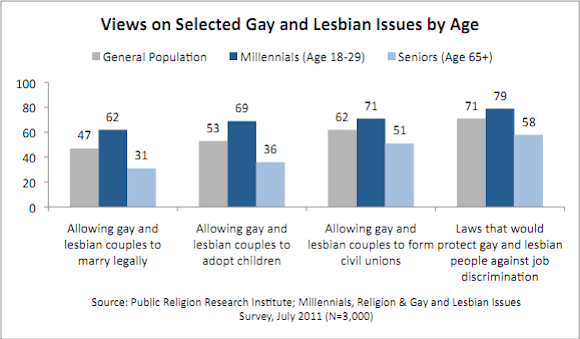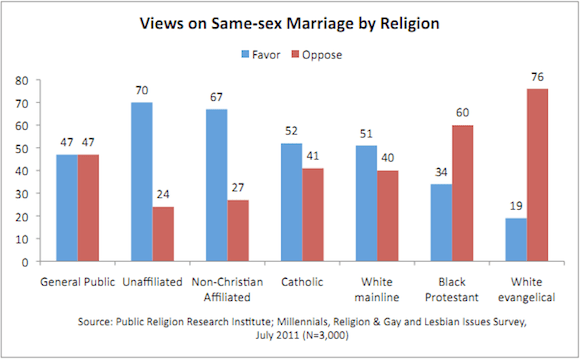feature image by Flickr user xflickrx
It’s not hard to observe that your grandma may have a different view about gay marriage than, say, the freshman class of your local liberal arts college. But now there’s evidence that opinions on public policy measures concerning gay and lesbian rights exhibit a huge generation gap, thanks to a new report released by the Public Religion Research Institute.
The report found that among the general population, 47% of respondents support legalizing gay marriage and 47% oppose it. These results echo several other recent studies, by Gallup, ABC News, and CNN, that placed support at between 51% and 53% and non-support at between 45% and 47%. In a statement, PRRI’s Dr. Robert Jones said, “This is the first year that support for allowing gay and lesbian couples to marry is not a minority position. Overall trends and the strongly supportive attitudes of the millennial generation suggest that we will look back on 2011 as the year marking a sea change in American attitudes on gay and lesbian issues.”
The poll found a self-reported increase of support for same-sex marriage: among respondents who say their views have changed in the past five years, 19% have become more supportive. And nearly two-thirds (64%) of respondents agree same-sex relationships should be accepted by society (though by the difference between that number and the level of support for gay marriage, clearly thinking something should be accepted and accepting it yourself are two different things).
The most interesting findings focus on what I am going to refer to as the Opinion Generation Gap of Doom, and religion.
1. The Opinion Generation Gap of Doom
According to the report:
“Millennials (Americans aged 18 to 29) are at the vanguard of the shift that is occurring on attitudes about gay and lesbian people and homosexuality. On basic questions of policy, views about gay and lesbian people in the church and in society, and moral judgments about homosexuality, Millennials are much more liberal than the general public and dramatically more so than seniors (Americans age 65 or older). It is difficult to find another issue on which there is deeper generational disagreement than on the issue of homosexuality and rights for gay and lesbian people.”
The report found that there is a 20-point or greater gap between the opinions of millennials (ages 18 to 29) and seniors (65 and older) on every public policy issue concerning gay and lesbian rights the PRRI looked at. According to the report, the Opinion Generation Gap of Doom is still true where conservative political and religious groups are concerned — across the board, millennials are more pro-rights than seniors and often their respective groups overall. For instance, 49% of millennial Republicans and 41% of millennial white evangelicals support same-sex marriage, compared with 31% of all Republicans and 19% of all evangelicals. It’s worth noting that the study’s sample size for young Republicans and white evangelicals was very small, but guys, nearing half of that sample in both instances was supportive: how amazing is that?
Interestingly, the generation gap is also peer(-pressure) supported: 64% of millennials say supporting gay marriage is more socially acceptable, while 56% of seniors say opposing it is more socially acceptable. Incidentally, 62% of millennials support same-sex marriage, while only 31% of seniors do. Basically, the world needs more awesome accepting grandmas to pressure everyone else into sending love when the grandkids come out.

Via the Public Religion Research Institute
2. Religion
Surprisingly, the poll found that several major religious groups fall on each side of the gay marriage debate (and not just on the sides of “sort of against” and “damnation and hellfire”). Non-Christian religiously affiliated Americans support allowing gay marriage at 67%. Catholics (52%) and white mainline Protestants (51%) also favour it. Less surprisingly, 60% of African American Protestants and 76% of white evangelicals oppose it. 46% of Catholics also think that the church’s stance on gay marriage and other issues is too conservative, and 69% think that it’s alienating young people as a result.
According to the Atlantic,
“The explanations for these cleavages can likely be found in nonreligious factors. Catholics in the U.S., for example, are more likely to live in urbanized states than evangelicals, predisposing them to adopting more socially liberal ideologies. The support gap between black and white mainline Protestants might be attributed in part to differing cultural pressures within those racial communities. What’s nevertheless strange is that these Christian groups, with a few exceptions, mostly take a hardline stance against gay marriage, yet followers adhere to those stances at vastly different rates.“
A majority of every religious group surveyed also believed that negative messages from religious institutions contribute (either “a lot” or “a little”) to higher suicide rates among gay youth. Maybe they should work on that.

Via the Public Religion Research Institute
In the long term, this is good news; it’s seeing the change you want to see in the world. In a relatively short time in terms of a nation’s history, those people we now refer to as “millenials” will be the ones making public policy, and raising families that will largely share their beliefs about social norms and human rights. As times change, religious organizations and churches will (slowly) change as well; faith isn’t static, and neither are faith communities. Acceptance is going to happen one way or another, no matter what. The question now is: what can we do to bring us closer to the future?



Not at all surprising. My sister’s always telling me if I can just wait for the older generation to die off things will change lol.
Yeah, but some of those people were the ones who fought long battles to get you your rights… I’m just saying that some old people are super cool.
I was going to say the same thing. My grandmother was at my wedding (and filled with great joy at seeing us married), and one of the last things my grandfather did was vote on Referendum 71 in Washington State in favor of Team Totally Right.
Of course, my other (Catholic, city dwelling) grandparents are the complete opposite…
Also, some of those super cool old people who fought for our rights would like to be able to (for example) get legally married in their home state / country before they die. They had a harder time of it than we have now, and I’d like to see them have equal rights for at least a small part of their lives.
Awesome article. But uh we millennials are a pretty accepting group (ages 18-290). ;)
you gotta watch for all those 300 year olds. JUDGMENTAL BITCHES.
When Prop 8 passed I said “Well if we’re being lazy about it all we have to do is just wait for most of the now old people to pass on and then make gay marriage legal” and my friends looked at me like I was some kind of asshole.
Obviously wishing death on people is a horrible thing, but on the other hand….I was technically right. And also understandably effing bitter, the day 8 passed was an awful one.
This was my reaction as well to Prop 8. I was like “Who do I have to wait to die before we can get married around here?”
I cried the day 8 passed
It was during my coming-out-anxiety period, so when it passed I was like “great, everyone really does hate me” and then had to listen to my parents make passive aggressive homophobic comments about the no on 8 protests. :\
I cried. And called my mom (who thankfully voted no on 8, unlike my dad). And cried some more….and I wasn’t even out to myself yet. At the point, I was supposedly only upset because it was so unjust. When my mom asked me why I was so upset about it, I couldn’t even articulate it.
the day Prop 8 passed was my 18th birthday
my entire family was celebrating its victory as they passed out the cake
Ouch. I just winced for you. :\
that’s reallly great. gaywads, all of our wildest dreams are coming true!
at my highschool we had an “election” in 2008 and no on 8 won. the bad news was we weren’t old enough to vote. good news is we are old enough to now
I’d be interested to know the results of a similiar survey done 20 or 30 years ago. What i wonder is – is this generational change, or is it just that younger people are inherently more likely to accept more diversity. In 20 years time will millenials still feel the same way?
Judgmental? Why not wait for religion to die out instead of the old to perish. A lot of old gays I know have suffered lots more than the young ever will, even in Holland where I live.
Huh. The biggest sign that attitudes have undergone a sea-change is that the Atlantic is publishing positive, unbiased reporting on gay issues.
This is just one of their many silent conservative moves, but when they ran a cover story on e-dating a few years ago (not more than 5 years), e-Harmony and their nasty fundie CEO was the focus of the article. OK, the Atlantic was well-aware that e-Harmony was a fundie Xtian site and that the CEO was strongly and vocally anti-gay rights. But did the Atlantic mention the fact that e-Harmony forbids same-sex matches? Nope. Did they mention the founder/CEO’s vocal and fervid animus against gays? Nope. Did they mention any other dating sites that invited same-sex singles? Nope. And the article was presented as the end-all, be-all ultimate informational guide to e-dating, the inroads it had made in ALL American society and the over-all, universal, all-inclusive impact of the changes it had made in Americans’ dating habits.
Huh. The Atlantic. Boldly going where 54-60% of their readership has gone before. (As long as that 54-60% number has been validated by at least 5 independent survey companies such as Nielsen.) I was receiving the magazine as a birthday present from some conservative relatives. I let it slide for a few months until I found another “anti-gay through ignoring us” article, then refused the gift.
Oh yeah, I do a lot of work with seniors. A lot. Weekly. I am openly and obviously a masculine-of-center, gender-queer dyke. Seniors can change their damn minds. And they do. Quickly. When you know you’re gonna die in a few years, some things that seemed very important when you were younger seem utterly meaningless when you’re facing mortality.
While I only have moderate experience with bigoted, scared seniors who are isolated or surrounded by Jeebus freaks in the middle of the country who hew to their old prejudices, I can tell you that many other seniors have been around the block a few times.. They’ve known gay people. They may not have approved of them earlier. But nowadays, they tend to be a bit more open. They know that many of the people who play cards with them, bring them their meals, take them to the pool for physical therapy, etc. are gay and they adjust to it pretty damned quickly. When you’re old and most of your lovers and friends have died, and there’s a new friend wanting to spend time with you, you forget about the whole “who do you sleep with” shit pretty fast. At least that’s been my experience.
Some of the most loving acceptance I’ve experienced has been from seniors I know at the retirement community I volunteer at with my dog. I cried the last time one of my senior friends came up and gave me a big hug and asked me how I was doing, how it was going with my new girlfriend, and how my dog was. It was so sweet.
That’s amazing! Maybe more of us should volunteer to work with seniors, if we want to move things forward.